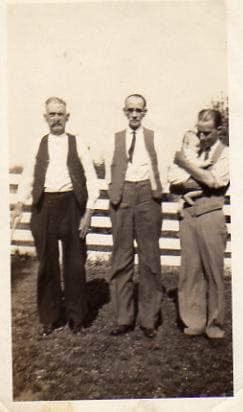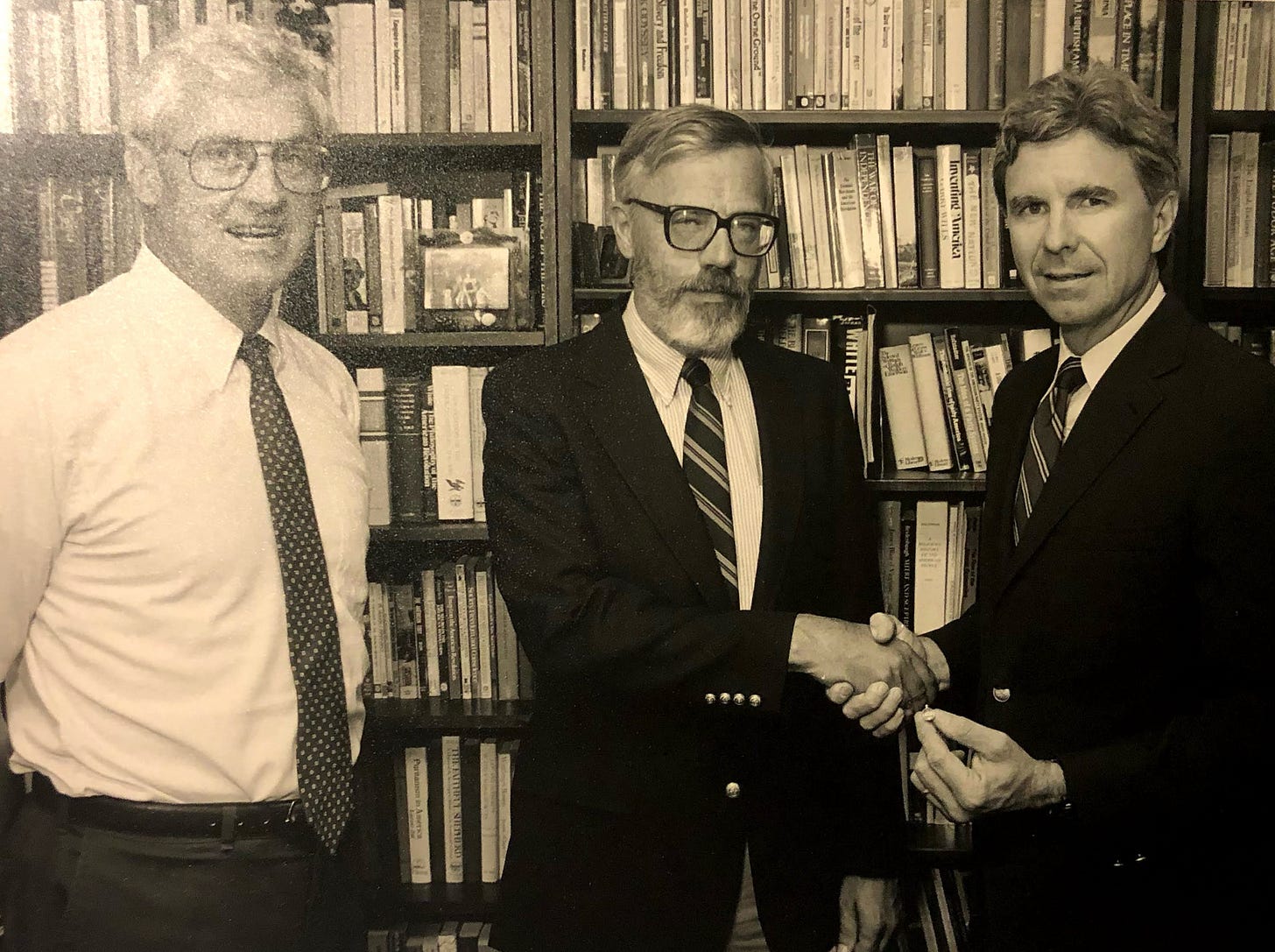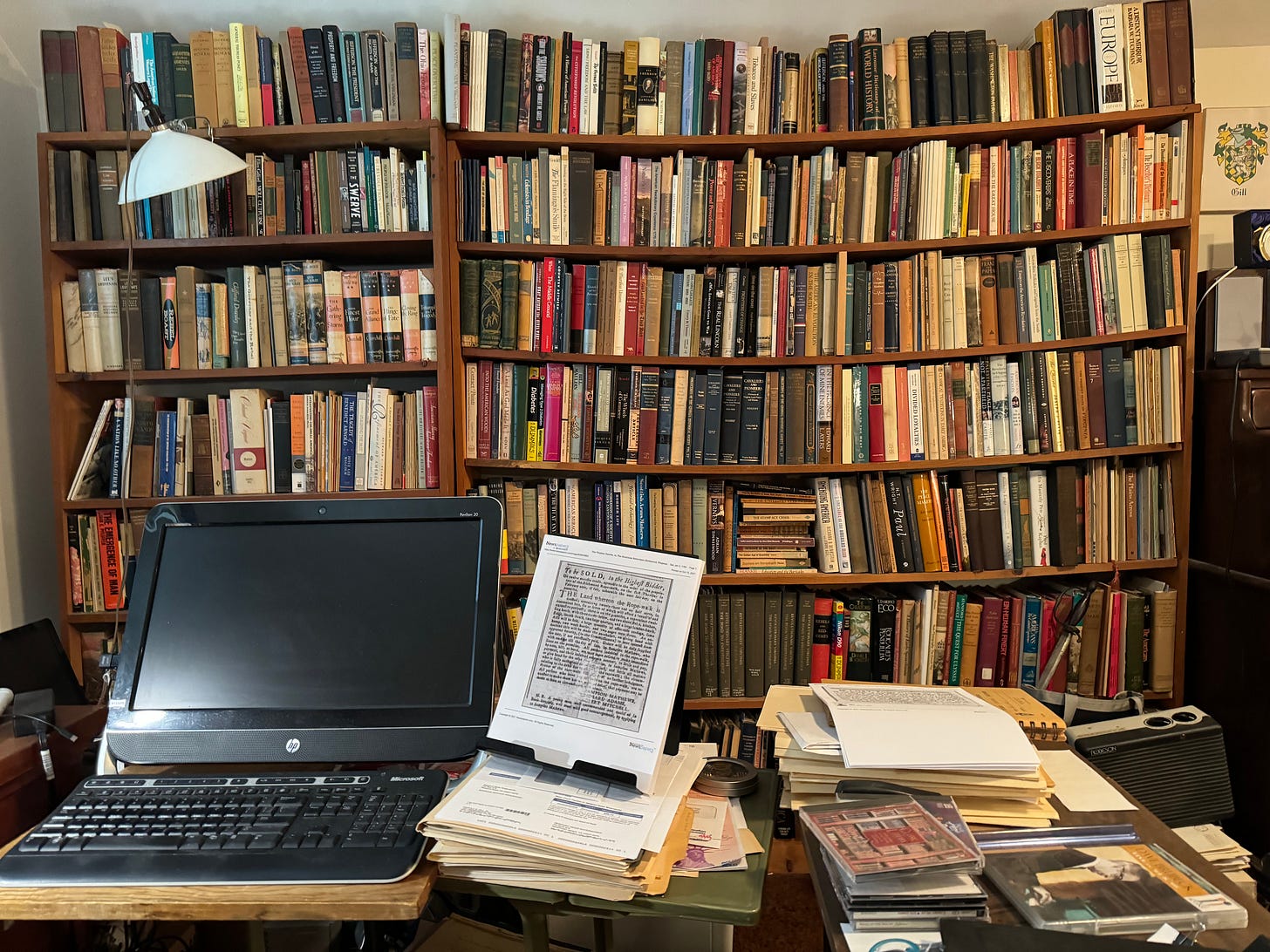A visit to my late father’s study was like stepping back in time in many ways. I am grateful that I thoroughly photographed it as it was when he shuffled off this mortal coil. He spent his life bringing the ordinary people of 18th century Williamsburg back to life through historical research and, in my way, I’m carrying that on as well here on “Harrowings.” I am hopeful that more than few of you will be moved to support this ongoing work. I’m picking up the pace of making postings and this is one of a series.
With that bit of house-keeping out of the way, I’d like to introduce the three Harold B Gills in the single photograph that I have of the three of us together.
We were photographed in my grandfather’s backyard in 1978 or so, I believe. My grandfather ran the Gill Electric Company for many years and an article about it was one of the first phase of the “Harrowings” of my father’s many papers:
Gill Electric Company
Harrowings is a reader-supported publication. To receive new posts and support my work, consider becoming a free or paid subscriber.
The full story is one of the many publications that is behind the paywall here. It is a way of segregating the publications that relate directly to the Harold B Gill Foundation, LLC, as opposed to the many that are reflective of my diverse interests.
My grandfather died sometime around midnight between August 12 and August 13, 1979. My father and I had spent a week with him while my grandmother, the late Katherine Elizabeth Gill (nee Jayne) was undergoing cataract surgery and recovery at Mary Washington Hospital in Fredericksburg. Dad and I would drive my grandfather back and forth to the hospital from their home on Monrovia Road. I was making model airplanes to fill the time when we were visiting. I remember my father and grandfather talking politics. My grandfather, although married to a native of Long Island, was not at all liberal. My father, also conservative, was practically a socialist by comparison. He was distressed at how distressed my grandfather was about the political scene a the time - Jimmy Carter, as you’ll recall, was our president at the time. We left around noon on August 12 and my cousin, Katherine Poe, took over the duties of looking after her grandparents.
Around midnight that night, our phone rang once which woke everyone up. Interestingly, the same thing happened to a number of other relatives. Soon after, we got the call from my cousin that my grandmother had come downstairs to find my grandfather unresponsive. The book he was reading at the time — The Cactus Air Force — had fallen from his chair in the living room. He had died of cardiac arrest.
His own younger brother, Charles Clinton Gill, Jr. (CC to the family), had passed away similarly just a short time earlier and had served in New Guinea during World War II. The Cactus Air Force was about the war in New Guinea so I can’t but think that he was missing CC and reading it to keep him close. My grandfather had a substantial library and I’m grateful to have quite a number of the books that he had in his collection still with me today. I digress.
The family assembled in the wee hours of August 13. My family drove from Williamsburg and I learned to drink coffee. I drank a lot of it. My grandmother, was, of course, distraught. She had been told by her doctors not to cry, however. She was given a prescription of valium to help her get through the preparations. A viewing was held at the funeral home and the funeral was held with a graveside service at Graham Cemetary. I remember very little about this other than that I was one of my grandfather’s pall-bearers.
When I start out writing these things, I never know where they are likely to lead, but here I am keeping a bit of my own memory intact by telling myself a story from when I was 16 years old. I had already encountered death when one of my fellow fifers fell through the ice of Queens Lake in Williamsburg, Virginia on January 21, 1976, if memory serves. My first dog had met the same fate the day before, apparently, but we wouldn’t learn about it for a few weeks until his body was discovered in the “First Lake” in the Birchwood Gardens neighborhood where my family lived between June 1963 and March 1977.
Love Remains - this is the deep print that has finally arrived now that my father has also passed on - and Love is the only thing that is truly eternal. We are all the product of the creative energy which is the essence of Love. Here we preserve many and we reach back into the Revolutionary War which was all about the love of freedom. In the following photograph, the grandson of Jones Gill who served in the Revolutionary War as a member of the Charles City County Militia in Virginia and later settled at Indian Creek stands next to his son, great- grandson, held by his grandson (again, left to right)

So, what is really revolutionary here? It’s love - the motivating factor for opening my own personal history while also driving forward to protect, preserve, and publish the creative works of my father. He was nothing if not a great lover of all things to do with history and veritably lit up when sharing his research with anyone who wanted to join in. During the 1980s, he ended up founding and co-editing “The Journal of Historic Trades” after he returned to Williamsburg from directing the Georgia Historical Society for a brief time. Here I am with him as he talks with the then-director of Human Resources during his retirement party ahead of moving to Savannah to take up that latter role:
To Dad’s left is Dr. Edward M. Riley who had hired him in December 1961 to serve as a Research Assistant. He was swiftly promoted to Associate and then to Historian before leaving the Department of Research. He had made such a reputation for himself in the Colonial Williamsburg Foundation, however, that the Director of Historic Trades went to extraordinary lengths to get him back to the Foundation. My mother was also not keen to leave her post as the Registrar at the Department of Collections — a position she had held since 1972 and from which she would retire in 2004. So it was that my father was back by 1986 and received his 25th anniversary bowl soon after. I believe this may be the official portrait from that ceremony:

Even after taking a proffered early retirement option at the age of 58 in 1991, my father continued working — assisting in editing the Colonial Williamsburg Journal's articles until 2015 - and died at the age of 91 with work-in-progress still there by his computer in his study where this article began:

I’ll conclude this installment of “Keeping The Dead Alive” here. More to come!





